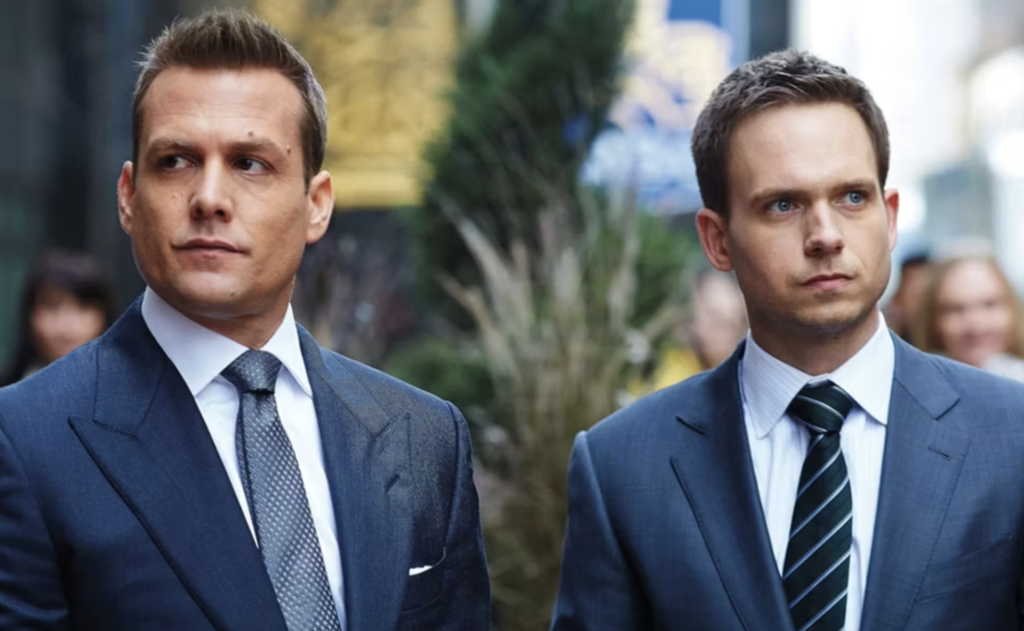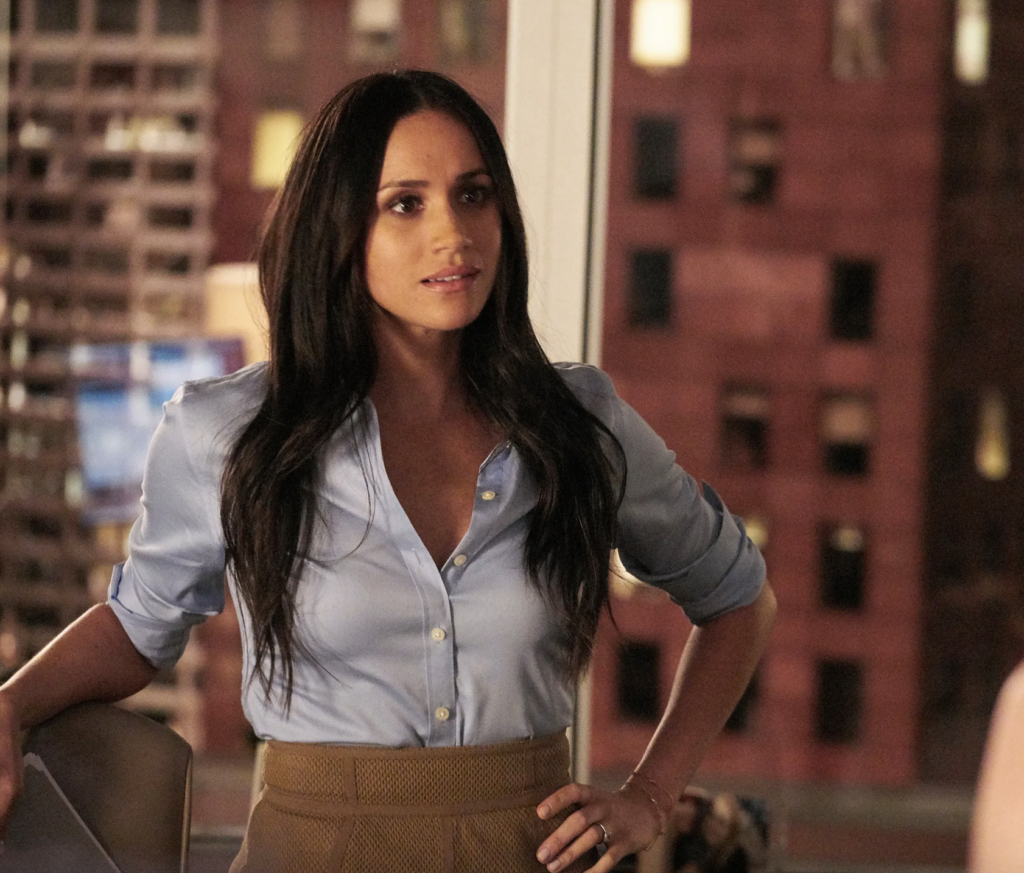Is “Suits” a perfectly constructed pilot?

Recently, I read an article that the two biggest streaming shows in America were Gray’s Anatomy and NCIS.
I’ve never personally met anyone who’s seen an episode of NCIS so, naturally, this was confusing to me.
I was also confused when, amidst a bottomless pit of shows on Netflix, many of which have had giant advertising campaigns, that the show that had become the most popular was one that had ended four years ago, “Suits.”
We have been led to believe that the TV landscape is dominated by prestige television shows such as Breaking Bad, Succession, Game of Thrones, and White Lotus. But the reality is, shows like Gray’s Anatomy, NCIS, and, yes, Suits, are the shows that truly get the ratings. Just not the love.
I decided to find out for myself if Suits was worthy of all the hype or if it was merely a curiosity brought about by the world’s obsession with Megan Markle (who plays a major character on the show). What follows are my thoughts.
Suits is set in New York City and follows a law firm led by Jessica Pearson, who’s trying to figure out if she should hand the firm down to her best lawyer, Harvey Specter. The problem is Harvey (a young George Clooney doppelgänger) is an arrogant blowhard who only cares about himself.
Harvey is on the lookout for a new lawyer, which is where Mike Ross comes in. Mike is a super-genius who’s had his life derailed by a couple of bad decisions and is in such a bad place that he actually agrees to deliver a suitcase full of drugs for money (that he plans to use for his sick grandmother, of course).
Mike goes to a hotel to make the drop but susses out that he’s being set up and makes a run for it… right into Harvey’s lawyer interviews. Mike stumbles his way into Harvey’s office where he accidentally opens the suitcase and all the drugs fall out.
Intrigued, Harvey asks Mike why he has a suitcase full of drugs and Mike tells him the truth. Further discussions lead Harvey to learn that Mike is beyond a genius and could run circles around all the Harvard applicants in the lobby. The kid is so raw, Harvey almost turns him away. But, in the end, he decides to take a chance on him. This leads to Mike’s first big case, a sexual harassment lawsuit.

Let’s cut to the chase.
Good writing is good writing is good writing.
It’s what I always tell people. Good writing prevails above all. It is almost impossible to find something that’s well written and completely ignored. Because good writing is rare. So when it arrives, it tends to birth a good product.
When it comes to TV, there are three writing ingredients that must thrive. The characters, the dialogue, and conflict. If you are good at these three things, you will be good at writing for television.
Cause TV isn’t so much about plot. Especially episodic shows like this one (case of the week). Plot is more for movies. The reason for that is, a movie needs a conclusion. And that’s where plot leads us. It gives us a goal and then, at the end of the story, we either succeed or fail at achieving that goal.
TV doesn’t need to end. It keeps going. So while there is plot in each individual episode (try to win the case), the plots are devoid of the kind of stakes that really matter. Cause who cares if Harvey and Mike win this week’s sexual harassment case? There’s going to be another one, just like it, next week.
For that reason, audiences come to TV shows more to hang out with the characters. Which is why all your TV writing should start with creating great characters.
Mike is a perfect character. Why? Two reasons. He’s an underdog and he’s super smart. These are two things that audiences DIE FOR. They love underdogs more than anything. This guy who didn’t even graduate law school being thrown into one of the biggest firms in New York — we love watching sh*t like that.
On top of that, audiences love characters who are smarter than everyone. There’s an early scene where Mike sniffs out that two men in the hallway (pretending to look like a bellhop and a guest) may be cops and he’s been set up with this drug delivery. So he asks the bellhop, “Hey, I was thinking about taking a dip later. How’s the pool here?” “It’s one of the best in the city, sir. You’ll love it.” Then we do a quick flashback of Mike earlier walking past the pool and a sign that says, “Pool closed for the summer.”
So we immediately know that Mike is smart. He uses his power of observation to stay ahead of everyone.
Then you have Harvey. I still don’t know exactly what the line is between hateable a$$hole and lovable a$$hole, but I know that audiences love lovable a$$holes. As long as the a$$hole is on our side.
One trick I’ve learned is to put our lovable a$$hole in the room with people who are worse than him. There’s an early scene where a client tries to railroad Harvey for not getting him everything he wants in their deal. But Harvey stays calm and outsmarts the guy, winning the conversation. In other words, if your hero is a bully and you want to make him likable, just add a bigger bully.
When it comes to dialogue, one thing I’ve noticed that these episodic TV shows live by is metaphors. They’re always using metaphors in the dialogue, which helps make the dialogue clever.
So, in the above scene where the client yells at Harvey, Harvey takes out a receipt of funds transferred and tells the guy that any threat to terminate their contract doesn’t matter because the firm has already received his money. The guy huffs out and it’s revealed that the piece of paper was a pointless memo. Harvey was lying.
Harvey’s boss then asks him, “How did you know he wouldn’t look closer and realize you were lying?”
Think for a second how you would write Harvey’s response. Because most beginner writers would write something like, “He’s a bully. And bullies never look closely at the details.”
It’s a lame lifeless line.
Here’s the line that Harvey actually uses in the pilot: “Cause a charging bull always looks at the cape, never the man with the sword.”
Now, is this the most brilliant line in the world? No. But it’s better than, “He’s a bully. And bullies never look closely at the details.” The metaphor automatically upgrades the line into something with more pop.
With TV, you really have to be on your dialogue game. If you are not a dialogue person, definitely stay away from this medium. It’s easier to get away with a lack of dialogue prowess in features because features are more plot driven, depend on exposition more (which is more technical), and are more about showing as opposed to telling. So you don’t have to write as much dialogue if you don’t want to.
Finally, we have conflict. Conflict is very simple to create. You put two people in a room who don’t see eye-to-eye, either about what’s happening in the moment, or in how they view the world in general. Or you give characters little goals and then throw obstacles in front of those goals.
The reason obstacles are great is not just to create conflict – which they do – but because they give your characters opportunities to shine, which is both entertaining and make us like the character more.
So that moment where Mike walks up in the hotel hallway and sees the bellhop and the fake guest — that’s an obstacle. Notice how Mike using the “is the pool open” bait shows him dealing with the obstacle in a clever way, which makes us like him more. The cops-in-disguise then chase him, which is where the conflict comes from.
Also, in the very next scene, when Mike interviews with Harvey, there’s conflict in that scene as well. Harvey clearly likes Mike. But he can’t hire someone who hasn’t even graduated law school. So there’s this tug-of-war where he challenges Mike with a series of problems that Mike passes one by one. Mike eventually wins him over and the conflict is resolved.
So if you’re good at these three things – character, dialogue, conflict – you can be a TV writer. And Suits is a great show to study for how to do it right.
[ ] What the hell did I just stream?
[ ] wasn’t for me
[ ] worth the stream
[x] impressive
[ ] genius
What I learned: I don’t know if there’s a better setup than taking someone who’s perceived as “not intelligent” (or who has street smarts, or who does things differently than you’re supposed to) and putting them in a scenario where they’re competing against the “smartest people in that industry.” It’s built perfectly for us to feel a sense of satisfaction every week when our supposedly “dumb” hero outsmarts the “smart” guys once again.

